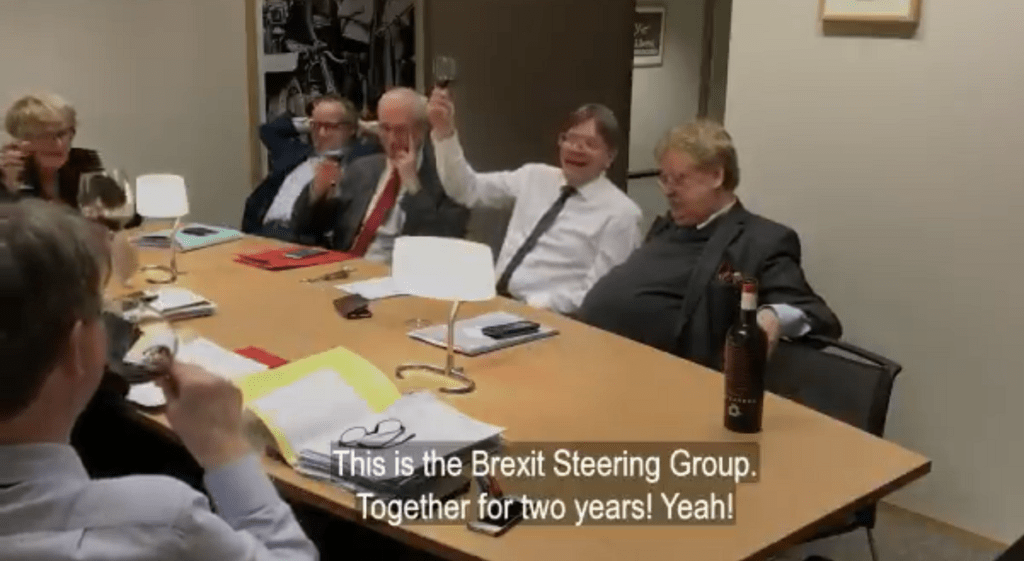BRUSSELS BEHIND THE SCENES
Weekly analysis and untold stories
With SAMUEL STOLTON
Other Brussels behind the scenes stories:
Johnson's hallucinations of sovereignty
Europe's Wine Dilemma
A cork is pulled from a bottle of red wine. Glasses clink against one another as MEPs raise a toast. Smiles rush over their fatigued faces as the syrupy, crimson liquid comes into contact with their dry tongues.
This is the European Parliament’s Brexit Steering Group in 2019. It is a habitual scene that familiarly graced the innards and offices of the European Parliament before ‘the pandemic.’
BRUSSELS BEHIND THE SCENES is a weekly newsletter which brings the untold stories about the characters driving the policies affecting our lives. Analysis not found anywhere else, The Brussels Times' Samuel Stolton helps you make sense of what is happening in Brussels. If you want to receive Brussels behind the scenes straight to your inbox every week, subscribe to the newsletter here.
Indeed, in certain closed-door meetings such as these, including the ultimate ‘black box’ in EU law-making - the trilogue negotiations between the Council, Parliament and Commission - it would have been odd for there not to be a trolley rolled out at some point in the proceedings, featuring a multifarious spread of snacks and booze. Wine would, more often than not, be the default choice.
But the wines of Europe are today drunk under very different circumstances. No longer is it a celebratory beverage or a drink that people turn to in collective orders, as a means to calm the shared and vicious tides of personal or vocational strain. Wine drinking is, for the time being at least, not a mutual activity. Today we drink it alone.
And for many, this goes against the very point of wine. In fact, the communality of the drink is one of its many standout qualities. It isn’t marketed to the public as something that you guzzle down on your own, slouching in the corner of your dusty studio apartment, flicking through late-night tv channels aimlessly. Wine should elicit something from the depths of our minds, it should unleash spontaneous and miraculous solutions to problems, it should allow us to revel in a shared and collective understanding of our achievements, and our failures.
Europe’s wine industries have had a tough time during the coronavirus pandemic. Reports that surfaced towards the end of last year suggested that in 2020, Spain’s grape harvest was expected to bring in 43 million hectolitres of wine. But in the current context, supply far outstrips demand. Research by The Guardian found that during the pandemic, restaurant sales of Spanish wine had fallen by 65% and exports by 49% since the onset of the virus in Europe.
Moreover, in recent months, wine choice has become political. Following China’s decision to impose tariffs of reportedly up to 212% on Australian wine imports, Western allies called upon citizens to help the Australian wine industry. In Brussels, MEP Miriam Lexmann published a video message encouraging European to “buy a bottle or two of Australian wine” in defiance of the Chinese communist party. Well, if there was ever a reason to uncork a bottle of quality Australian red, what better a purpose? Here’s to you, Xi Jinping.
But then again, in the wider world of wine diplomacy, the EU has had its own problems, to which the European Commission’s Agriculture Commissioner Janusz Wojciechowski attested to this week.
In response to a European Parliamentary question, Wojciechowski noted that there has been a downward trend for exports of EU wines, probably due to an increase in tariffs from the US. Last year, Washington had imposed punitive duties of 25% on certain EU products, including wine, due to an ongoing disagreement over subsidies for aircraft manufacturers Airbus and Boeing.
And tragically, there is no cause for celebration for our beloved Champagne, either. Earlier this year, the the Comité Champagne published its preliminary sales figures for 2020, which recorded an 18 percent drop in the volume of bottles sold, and a 20 percent loss in the value of that trade. However, in analyzing those figures across the year, it appears that certain sales had spiked during times in which the coronavirus restrictions were loosened, according to Jean-Marie Barillère, President of the Union des Maisons de Champagne.
Speaking at the Comité Champagne’s virtual conference towards the end of January, Barillère said that such trends could be interpreted as a “reason for hope,” and that Europe may experience some sort of an “after-war effect” when the coronavirus has eventually been defeated.
"When people regain their freedom, they celebrate with Champagne,” he said.
And while the impact of the ongoing coronavirus restrictions on the hospitality sector and the US trade retaliations have spelt real danger for the EU’s wine industries, there remains a desperate fantasy that keeps the grape harvesters of Europe in a spirit of optimism: that our forthcoming ‘freedom’ from the shackles of the coronavirus will be toasted with a glass of something strong, something European. When we’re finally out of this pandemic, let’s hope that this is more than a dream.
BRUSSELS BEHIND THE SCENES is a weekly newsletter which brings the untold stories about the characters driving the policies affecting our lives. Analysis not found anywhere else, The Brussels Times' Samuel Stolton helps you make sense of what is happening in Brussels. If you want to receive Brussels behind the scenes straight to your inbox every week, subscribe to the newsletter here.

